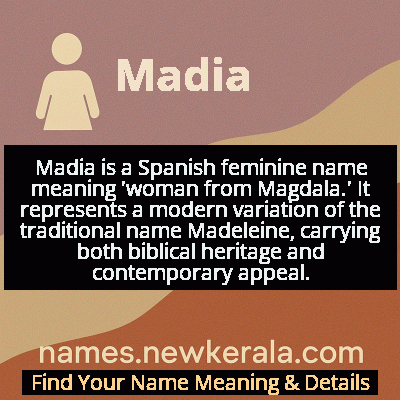Madia Name Meaning & Details
Origin, Popularity, Numerology Analysis & Name Meaning of Madia
Discover the origin, meaning, and cultural significance of the name MADIA. Delve into its historical roots and explore the lasting impact it has had on communities and traditions.
Name
Madia
Gender
Female
Origin
Spanish
Lucky Number
1
Meaning of the Name - Madia
Madia is a Spanish feminine name meaning 'woman from Magdala.' It represents a modern variation of the traditional name Madeleine, carrying both biblical heritage and contemporary appeal.
Madia - Complete Numerology Analysis
Your Numerology Number
Based on Pythagorean Numerology System
Ruling Planet
Sun
Positive Nature
Leaders, ambitious, highly driven, self-reliant, innovative.
Negative Traits
Overly aggressive, domineering, impatient, selfish.
Lucky Colours
Red, orange, gold.
Lucky Days
Sunday.
Lucky Stones
Ruby, garnet.
Harmony Numbers
2, 3, 9.
Best Suited Professions
Entrepreneurs, managers, engineers.
What People Like About You
Courage, determination, leadership.
Famous People Named Madia
Madia Tovar
Spanish dancer
Renowned flamenco dancer who performed internationally and helped popularize Spanish dance traditions
Madia de la Torre
Educator and writer
Influential Spanish educator who developed innovative language teaching methods for bilingual students
Madia Jiménez
Environmental activist
Founder of conservation organizations focused on protecting Spanish coastal ecosystems
Name Variations & International Equivalents
Click on blue names to explore their detailed meanings. Gray names with will be available soon.
Cultural & Historical Significance
In Spanish culture, Madia represents a modernization of traditional names like Magdalena while maintaining their spiritual essence. The name carries connotations of devotion, strength, and transformation, reflecting Mary Magdalene's journey from her past to becoming a key figure in early Christianity. Throughout Spanish history, the name has been associated with women of strong character and deep faith, often chosen by families wanting to honor religious traditions while embracing more contemporary naming styles.
The name also reflects the Spanish cultural value of maintaining family and religious traditions while adapting to modern times. It represents the continuity of faith across generations while allowing for individual expression. In many Spanish-speaking communities, choosing a name like Madia demonstrates a family's commitment to their religious roots while embracing the evolving nature of cultural identity in the contemporary world.
Extended Personality Analysis
Women named Madia are typically perceived as possessing a unique blend of spiritual depth and practical wisdom. They often exhibit strong intuitive abilities and emotional intelligence, making them excellent listeners and trusted confidantes. Their personality combines traditional values with modern thinking, allowing them to navigate complex social situations with grace and understanding. Madias are known for their loyalty and dedication to those they care about, often serving as pillars of strength within their families and communities.
These individuals tend to be creative problem-solvers who approach challenges with both compassion and determination. They possess an inner resilience that helps them overcome obstacles while maintaining their core values. Madias often demonstrate leadership qualities through quiet influence rather than overt authority, earning respect through their consistent character and genuine concern for others. Their balanced nature allows them to bridge different perspectives and bring people together, making them valuable mediators and community builders.
In personal relationships, Madias are typically warm, empathetic, and deeply committed. They form strong bonds based on mutual trust and understanding, and they often serve as the emotional anchors in their social circles. Their combination of traditional values and contemporary outlook enables them to relate to people across different generations and backgrounds. While they may appear reserved at first, those who know them well appreciate their depth of character, unwavering support, and the quiet strength they bring to every situation.
Modern Usage & Popularity
In contemporary times, Madia has experienced a resurgence as parents seek names that honor tradition while feeling fresh and distinctive. While not among the most common Spanish names, it has gained popularity among families looking for biblical names with modern appeal. The name appears more frequently in urban areas and among educated families who appreciate its historical roots and elegant sound. Recent naming trends show Madia becoming increasingly popular in Spain and Latin American countries, particularly among parents who want a name that bridges their Catholic heritage with contemporary naming preferences. Its relative rarity adds to its appeal for parents seeking unique yet meaningful names for their daughters, and it's often chosen by families wanting to honor religious traditions without using more common biblical names like María or Magdalena.
Symbolic & Spiritual Meanings
Symbolically, Madia represents transformation, devotion, and the integration of spiritual and worldly wisdom. The name carries the metaphorical meaning of journeying from darkness to light, reflecting Mary Magdalene's biblical narrative of redemption and faithful service. It symbolizes the ability to maintain faith through challenges and emerge stronger, representing personal growth and spiritual evolution. Madia also embodies the balance between tradition and modernity, serving as a bridge between historical religious values and contemporary life, making it symbolic of cultural continuity and adaptation. The name signifies feminine strength and resilience, representing women who maintain their integrity while navigating life's complexities, and it carries connotations of wisdom gained through experience and the capacity for deep, transformative love and commitment.

